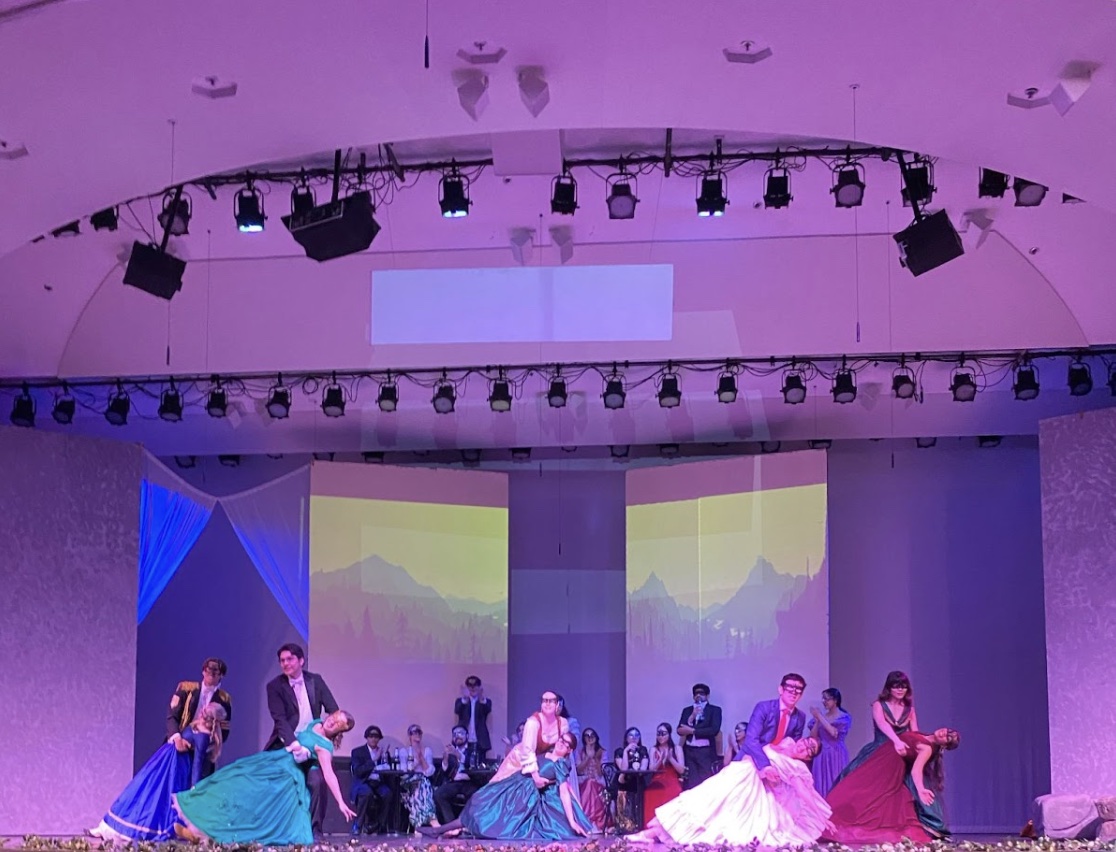The Stanford Light Opera Company’s (SLOCo) interpretation of “Die Fledermaus,” directed by Nicolle Hendzel ‘23, stunned crowds over the weekend with its modern feminist take on the normally traditional opera.
“Opera has traditionally been written by men, for men and about men, rarely taking female perspectives into account and failing to give them agency in the plot or in their own history,” said director Nicolle Hendzel ‘23 on the feminist angle. Hendzel also performed in the show as Rosalinde for two of the four nights.
Opera lovers from Stanford’s campus and the Bay Area community flocked to Dinkelspiel Auditorium to see the performance and left grinning. I was immediately left in awe by the voices of the lead and supporting actresses, who seemed to steal every scene and song with their stage presence. While at times lines and verses in songs were lost on the audience due to the lack of mics on cast members during the show, I was impressed with the overall volume and clarity that the cast maintained.
According to the program for “Die Fledermaus,” Johann Strauss II’s goal was to create a parody of classical Viennese opera in the Mozartian style. Strauss mirrored Mozart’s capacity to stand against late 18th-century performance norms by exploring folk topics in his own pieces. “Die Fledermaus” mocks the aristocratic couple of Gabriel von Eisenstein (performed by Jonathan Saatman, CSU Sacramento ’22) and Rosalinde (performed by Hendzel and Jin-Hee Lee ’23). Lee’s interpretation of Rosalinde on Sunday showcased her talent in numerous songs, and I got chills from her powerful and strong voice.
The Stanford Light Opera Company approached the comedy through a feminist take by flipping the opera’s traditional power dynamics. Whereas more traditional productions of this opera have placed men in powerful roles, this production recasts the characters to divert the power to the women in the opera. Characters such as Dr. Falke (performed by Flora Yuan ’26) and the prison’s warden Frank (performed by Alexandra Breschini ’26) were recast to give more agency to women in this reimagined production of “Die Fledermaus.”
At the masquerade ball, Gabriel von Eisenstein attempts to cheat on his wife with a “Hungarian countess,” whom he does not know is really his wife Rosalinde. This joke was played up by Lee, who broke the fourth wall and maintained her fake Hungarian accent when her character stole the pocket watch of her husband.
“I wanted to embrace Fledermaus’ gender-bent nature by making the orchestrators of the great prank and the characters in positions of power female to accent the message that women facing unfair treatment from those around them have won this round,” explained Hendzel when describing her directorial and visionary approach to this production.
She added, “My other goal with ‘Fledermaus’ is also why I decided to become president of SLOCo this year: to provide a safe place on campus for classically-inclined singers to grow and learn.”
The costume, set and lighting design were all exaggerated in Acts II and III to heighten connection to the Mozartian style. Colorful satin ball gowns, tuxedos and masks filled the stage with a breathtaking elegance. While Act I offered no hint of the amount of action that was about to unfold, Act II and Act III had stand-out performances, including a huge dance number, exciting duets and a heart-stopping feature solo performed by Annette Dong ’24.
In the last, edge-of-your-seat moment, it is revealed that Rosalinde and the group have played a prank — or, per the translation of the play’s title, the “Revenge of the Bat” — on Gabriel von Eisenstein. He has been flirting with other women throughout the show, attempting to have an affair with the so-called Hungarian countess, and is found out to have skipped his jail sentence of eight days. The characters and the audience laugh it off as a prank, which deepens the satire that Strauss is employing in these moments of absurdity in the Viennese opera characters. The audience left the auditorium smiling and its cast and crew with a standing ovation.
“In an industry that is still adapting to its complicated past, it’s important that young singers, especially women, are given the opportunity to see how they deserve to be treated in this educational setting and most importantly, to have fun,” said Hendzel on the future of the opera industry.
In the end, I was left admiring the hard work of this company that created a colorful and humorous rendition of a classic operetta this weekend.
Editor’s Note: This article is a review and includes subjective thoughts, opinions and critiques.
